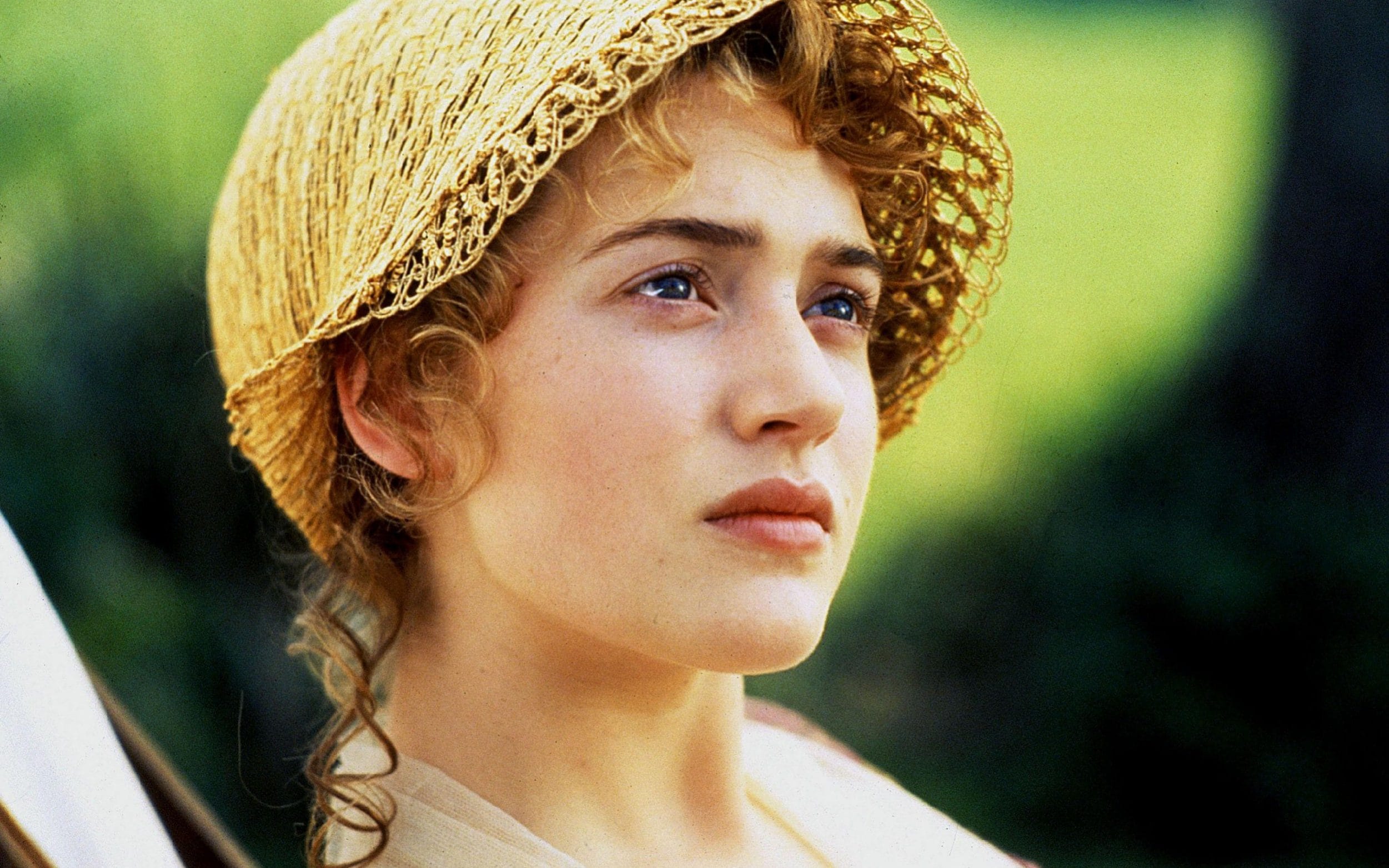If you have spent much of your childhood and adulthood wishing you were a part of a Jane Austen-esque world, these ten book-to-screen adaptations of Austen’s works are the right place to start!
Jane Austen was an English novelist popularly known for her six novels exploring the patriarchal social mores of her time while also foregrounding female desire and all the obstacles that lie in its path. She published most of her works anonymously, owing to the cultural resistance against the idea of women becoming writers, and most of her success came after her death. Fittingly, her stories typically revolve around the plights of women often forced to choose the path of marriage so as to secure for themselves any upward social mobility (or, sometimes, just a decent life beyond poverty).
As an early practitioner of literary realism and one of the first feminist writers, Austen has left us a rich literary legacy that continues to influence countless writers to this day. Her stories have naturally been adapted numerous times, both for stage and screen, with very few of them coming close to matching the greatness of her books. In this list, we explore the 10 best Jane Austen book-to-screen adaptations that do justice to the spirit of her works while occasionally introducing changes that sensibly update the tales for contemporary viewers.
- 10. Mansfield Park (1999 film)
- 9. Northanger Abbey (2007 TV film)
- 8. Love & Friendship (2016 film)
- 7. Emma (2020 film)
- 6. Sense and Sensibility (2008 TV series)
- 5. Persuasion (1995 film)
- 4. Clueless (1995 film)
- 3. Pride and Prejudice (2005 film)
- 2. Sense and Sensibility (1995 film)
- 1. Pride and Prejudice (1995 TV series)
10. Mansfield Park (1999 film)
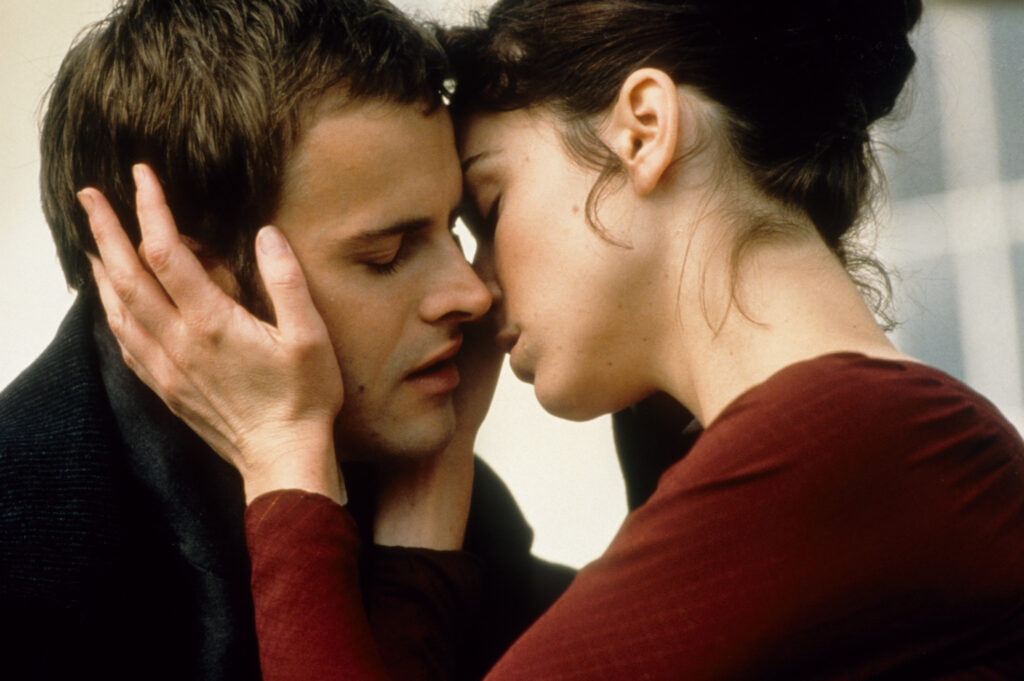
in Mansfield Park (1999)
Considered by many to be Austen’s most controversial novel, Mansfield Park’s 1999 film adaptation has evoked similarly polarising reactions. A 10-year-old Fanny Price (Frances O’Connor) is sent to live with her wealthy uncle and aunt, Sir Thomas (James Purefoy) and Lady Bertram (Lindsay Duncan), at their country estate in Mansfield Park. There, Fanny is treated poorly by almost everyone except for her cousin Edmund (Jonny Lee Miller). The two of them develop a friendship destined to end in marriage, and the film follows Fanny’s woes living at Mansfield Park from her youth to young adulthood, incorporating details from Austen’s own life into the plot.
The director Patricia Rozema aimed for a fresh reinterpretation of the classic book and departed from Austen’s work in insignificant ways, which have led to a split in critical reactions. Mansfield Park does away with many of the usual trappings of conventional period dramas to update it for modern viewers, focusing more on themes of feminist and racial critiques. As a result, while some have lamented the distinct changes from the novel’s plot, others have lauded the same for taking the film closer to Austen’s spirit. While the original was more conservative and even prudish (to a fault, some might say), Rozema’s adaptation overtly references sexuality and weaponizes the same for critical purposes.
9. Northanger Abbey (2007 TV film)
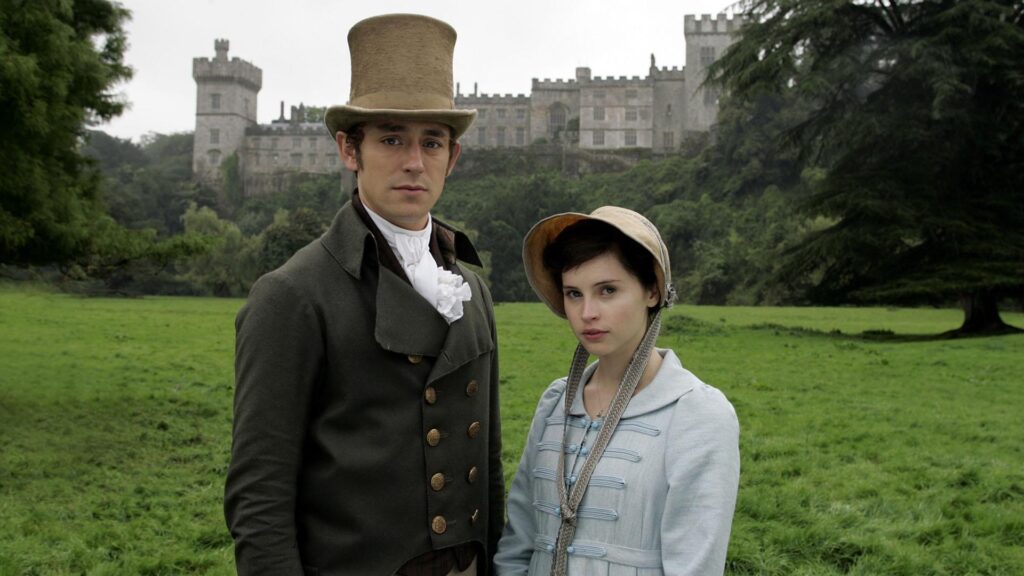
Not one but two Oscar-nominated actresses star in this 2007 television movie adaptation of Austen’s Northanger Abbey, a Bildungsroman about the seventeen-year-old Catherine Morland (played by Felicity Jones). The tomboyish Catherine, passionate about Gothic novels and possessing a hyperactive imagination, is invited by her wealthy neighbors to spend the winter at Bath to attend the seasonal festivities. There, she is courted by Henry Tilney (JJ Field) and John Thorpe (William Beck), the latter the brother of Isabella (Carey Mulligan), who also happens to be engaged to Catherine’s brother James. Like most impressionable teens, Catherine’s interpretation of her reality is heavily influenced by the fiction she consumes, which (in this case) happens to be the Gothic kind.
This leads her to misread situations and misunderstand the people around her, the consequences serving as sobering lessons for the girl entering womanhood. Produced for the British network ITV, Northanger Abbey features a slew of impressive performances as it gathers together some of the finest talents in British television – like Liam Cunningham, popularly known for playing Davos Seaworth from HBO’s Game of Thrones. Like a lot of modern-day adaptations of Austen’s work, Northanger Abbey attempts to reinterpret the classic tale for contemporary audiences by infusing it with more humor and being bolder about its depiction of sexuality.
8. Love & Friendship (2016 film)
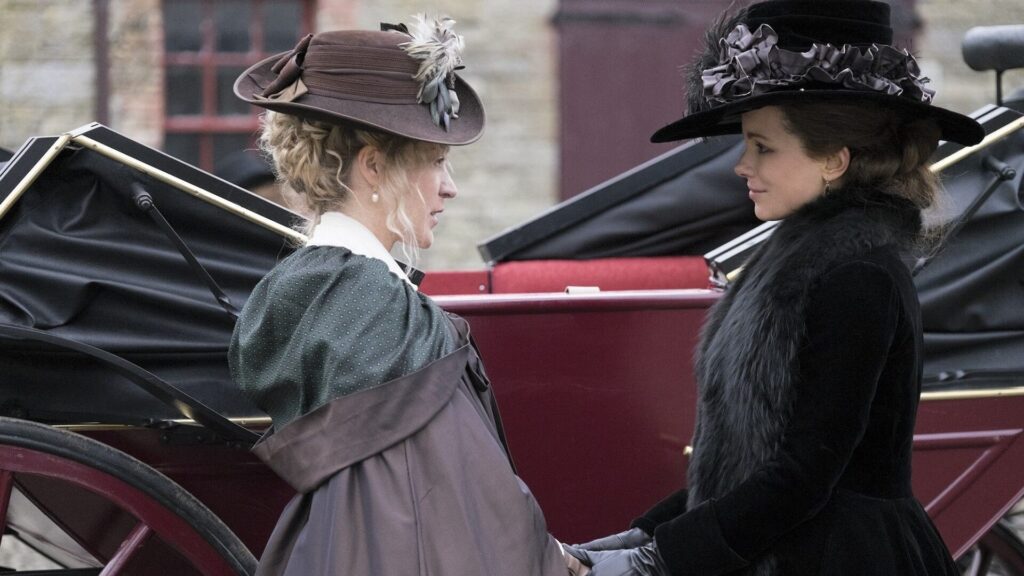
An adaptation of Austen’s epistolary novel Lady Susan, the film Love & Friendship actually derives its title from a different story written by a 15-year-old Austen, the latter also following the epistolary format despite sharing nothing plot-wise with the former. Kate Beckinsale, who previously starred in the 1996 adaptation of Jane Austen’s Emma, plays the scheming Lady Susan, a widow seeking to marry again and find a match for her daughter Frederica (Morfydd Clark). At her brother-in-law’s country home in Churchill, the flirtatious Lady Susan strikes up a relationship with a certain Reginald DeCourcy (Xavier Samuel), even though Reginald’s father disapproves of the match. Meanwhile, Frederica is expelled from her school and joins her mother at Churchill while being courted by the simpleminded (but wealthy) Sir James Martin (Tom Bennett).
Frederica, however, has no intention of marrying James Martin and instead has her eyes on Reginald, who is betrothed to Lady Susan (although the latter tries delaying their marriage). Meanwhile, more skeletons tumble out of the closet as Lady Susan’s affair with Lord Manwaring is discovered by Lady Manwaring, requiring Lady Susan to come up with even more tricks up her sleeve to save her honour and have a shot at a prosperous wedding match. In the hands of director Whit Stillman, Love & Friendship becomes a riotously funny watch, filled with little self-aware moments that plumb the comedic depths of Austen’s novel. It also serves several delightful performances, with a cast full of fresh yet talented actors and a memorable cameo from the British thespian Stephen Fry.
Also Read: The Best Work of Charlotte Bronte & Why Should You Read Them
7. Emma (2020 film)
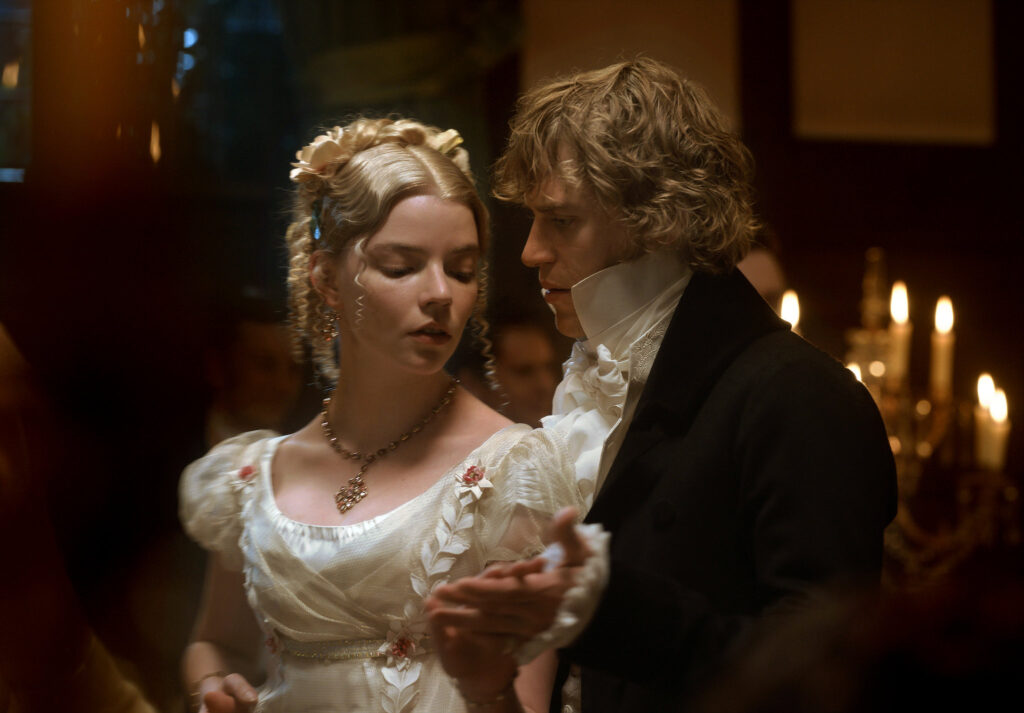
Anya Taylor-Joy stars as the titular Emma Woodhouse in this adaptation of Austen’s 1815 novel Emma, a comedy of manners revolving around one woman’s attempts to manipulate the relationships of the people around her. The wealthy Emma fancies herself a matchmaker as she goes about trying to fix people together, often inadvertently doing more harm than good. When her governess marries off, Emma looks for a new companion in the young Harriet Smith (Mia Goth). However, when Harriet receives a marriage proposal from Mr. Robert Martin (Connor Swindells), Emma interferes and dissuades her from accepting. Instead, Emma encourages Harriet to pursue the local vicar Mr. Elton (Josh O’Connor), whom she imagines to be in love with Harriet.
Meanwhile, seeds of romance blossom between Emma and a local landowner Mr. Knightley (Johnny Flynn), whose brother is already married to Emma’s sister. A series of comic misunderstandings follow, with Emma repeatedly misreading others’ intentions and getting carried away by her own presumptions. Directed by Autumn de Wilde, Emma’s rich production design stunningly recreates the lavish lifestyles of early 19th-century England, even as its dramatic style represents something more idiosyncratic (and more modern) than the spirit of Austen’s original. The film’s costumes and makeup earned it two Oscar nominations, while Anya Taylor-Joy’s leading role earned her a Golden Globe nomination.
6. Sense and Sensibility (2008 TV series)
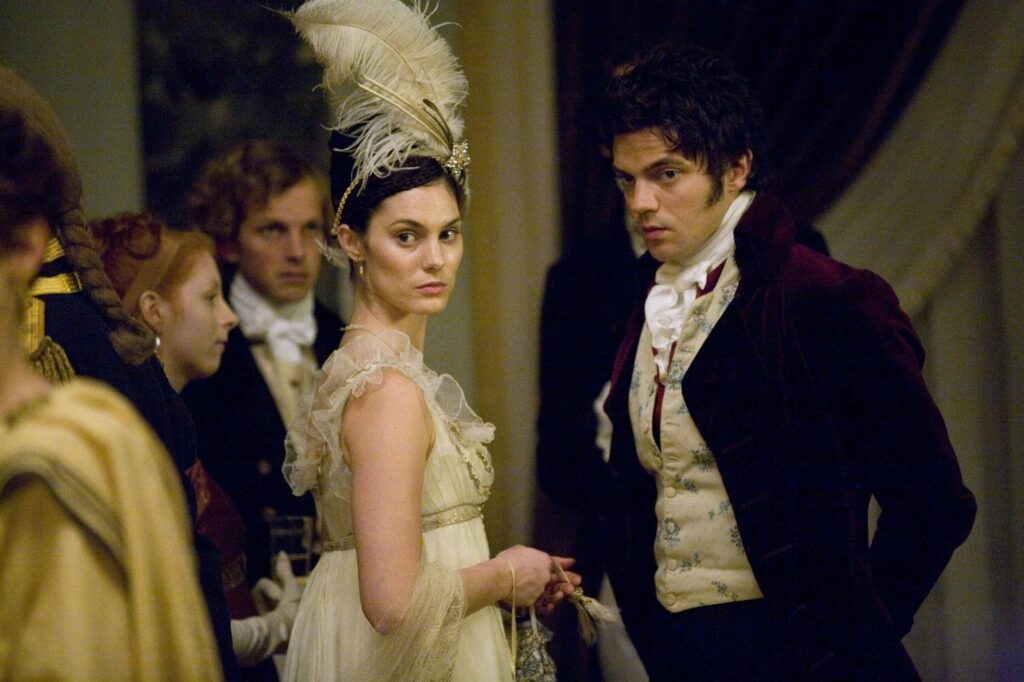
Not as well-known or acclaimed as Ang Lee’s 1995 film, this British television adaptation of Sense and Sensibility still stands out for its boldly imaginative take on a classic. Hattie Morahan and Charity Wakefield play the Dashwood sisters Elinor and Marianne, who – along with their mother Mary and little sister Margaret – must leave their home at Norland Park after their father Henry Dashwood dies and the family estate passes to Henry’s first son John (Mark Gatiss). They move to Barton Park after Mrs Dashwood’s cousin offers her a cottage, and there they meet a family friend, Colonel Brandon (David Morrissey), who falls for Marianne.
The story follows the two sisters as they navigate a world where wealth and social standing often obfuscate the promises of romance. Andrew Davies, who adapted the screenplay, has clearly admitted that his version aims to make people forget the older Ang Lee version by emphasizing the tale’s sexual overtones. The male characters are more overtly masculine in their demeanor as compared to Hugh Grant and Alan Rickman’s softer depictions in Lee’s film. Gorgeously shot, with lighting and color greatly shouldering the narrative burden, Sense and Sensibility earned cinematographer Sean Bobbitt a well-deserved Emmy nomination. Fans of Austen looking for something different in a more modern vein than the usual fare of period dramas would do well to check out this BBC series.
5. Persuasion (1995 film)
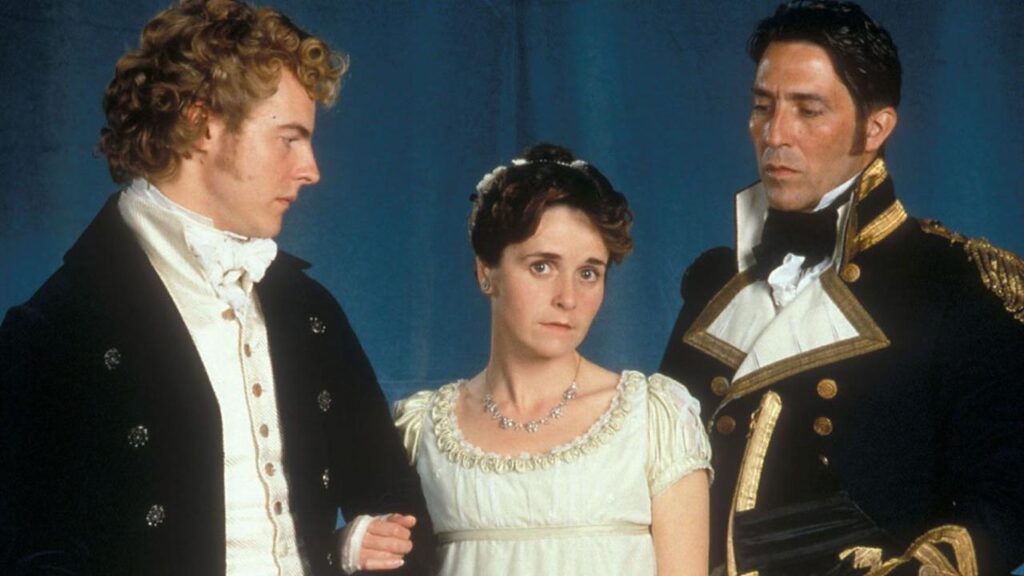
One of the more realistic adaptations of Austen’s work, this 1995 BBC adaptation features notable changes from the original when it comes to the plot while recreating the look and feel of that period more faithfully than most. Unlike most period dramas, Persuasion features actors without much makeup or wearing lavish costumes, thanks to director Roger Michell’s commitment to realism in striving for a more lived-in appearance. It tells the story of Anne Elliot (Amanda Root), a 27-year-old Englishwoman whose aristocratic family has fallen into financial woes. They rent out their family estate to an admiral and his wife, and, as fate would have it, the admiral’s brother turns out to be the same Captain Frederick Wentworth (Ciaran Hinds) to whom Anne was engaged years ago.
The Captain has recently returned from profiteering in the Napoleonic Wars, rich and presumably looking for a wife. With circumstances forcing them together again after initially pulling them apart, Anne and Frederick get a second shot at developing their relationship. While most Austen screen adaptations have attempted to update her tales for contemporary sensibilities, Persuasion stands out for its clinical accuracy when capturing the spirit of the original. Exuding great care and patience in letting the drama unfold on its own terms, the filmmakers come as close as one possibly could in recreating the novelistic experience of reading Austen’s most mature work.
Also Read: 9 Films and TV Shows to Watch if you like Persuasion on Netflix
4. Clueless (1995 film)
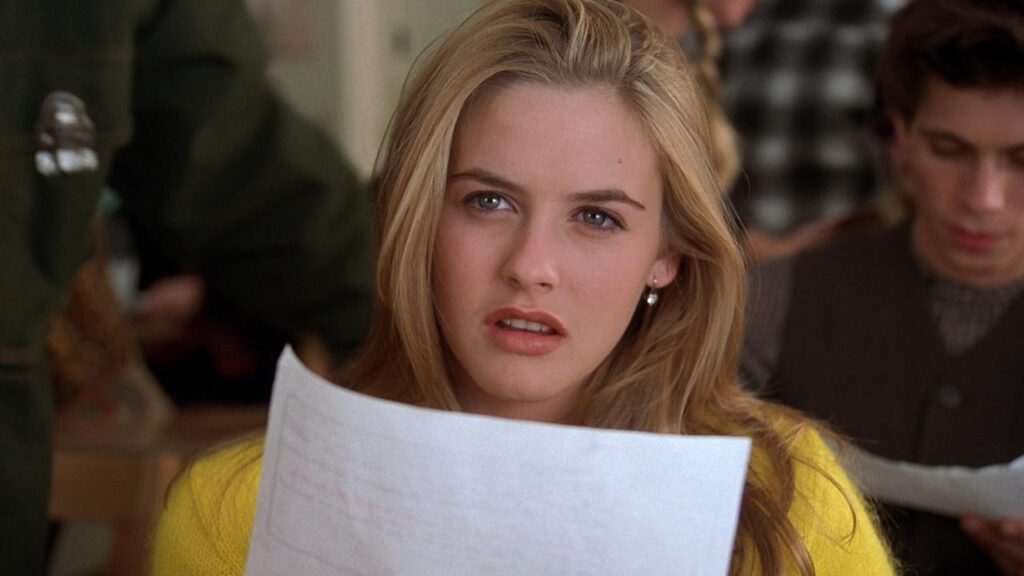
Only loosely based on the original source material, Clueless is a modern-day reimagination of Jane Austen’s Emma as a teen comedy movie set in Beverly Hills. The matchmaker Emma Woodhouse becomes the carefree and entitled Cher Horowitz (Alicia Silverstone), while Emma’s love interest, Mr Knightley, is here represented by Cher’s former stepbrother Josh (MCU star Paul Rudd). Within the first fifteen minutes of the film, we see Cher getting two teachers from her school to start dating each other, and this success encourages her to apply her matchmaking skills to newcomer Tai Frasier (Brittany Murphy). Tai, the correlate of Harriet Smith in the novels, is a shy transfer student and is given a makeover by Cher, going from clueless to confident and eventually eclipsing even Cher’s popularity.
Since its release, Clueless has gone on to become a cult classic and is widely considered to be one of the best teen movies ever made, churning out spin-offs in the form of a TV sitcom, a series of books, a stage musical, and even video game adaptations. Standing clearly apart from traditional Jane Austen adaptations, the film nevertheless reprises the fundamental themes of the original and bears more than skeletal parallels to the novel’s narrative. It functions as a satire of its parent genre, the teen film, while also situating itself as an exemplary work within that tradition. If you’re looking for a completely fresh take on Austen’s classic that doubles as a tongue-in-cheek exploration of the American high school experience (as it is for the wealthy few, at least), Clueless should definitely be your next watch.
3. Pride and Prejudice (2005 film)
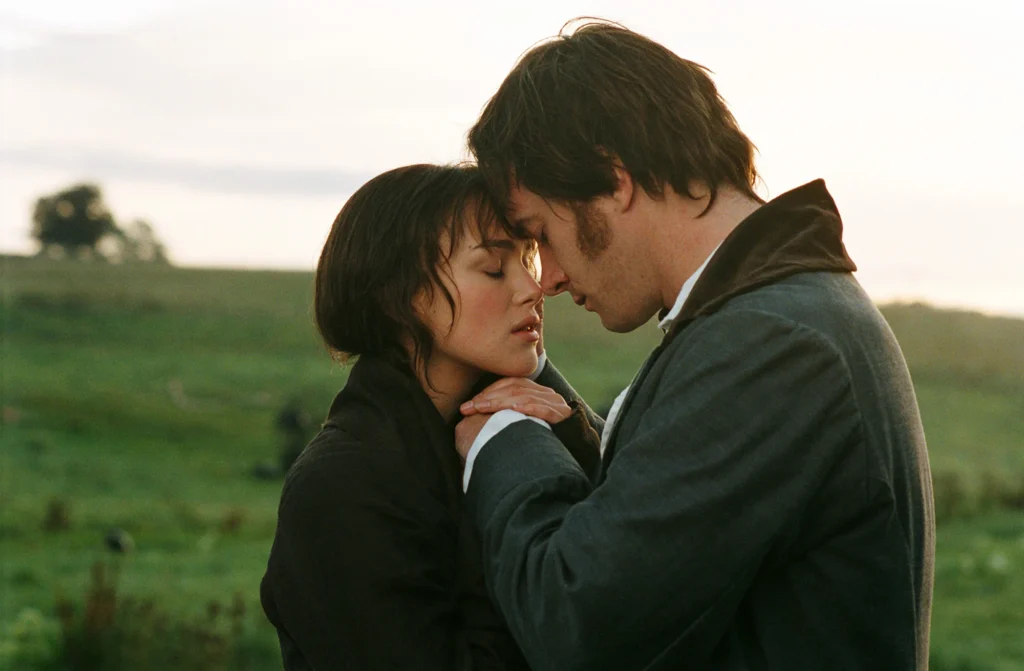
Possibly Austen’s most popular novel, the 1813 Pride and Prejudice has spawned a number of screen adaptations, although very few can claim to have done justice to the book. This 2005 film with debutant director Joe Wright at the helm, based on a screenplay by British novelist Deborah Moggach, comes really close to that ideal while adding a fresh spin to the classic tale. It’s centered on the character of Elizabeth Bennet (Keira Knightley), who, along with her four sisters, has to deal with the imperative of finding a wealthy husband to be able to support their family. They live at the Longbourn estate in Hertfordshire, owned by their dad, Mr Bennet (Donald Sutherland), which, by law, can only pass to a male heir. Thus, failure to find a good wedding match for the girls could mean living in poverty upon their father’s death, as the estate would pass on to some distant cousin whom they’ve never met.
This becomes the source of conflict driving the plot forward, which leads to Elizabeth meeting the enigmatic Mr. Darcy (Matthew Macfadyen). While Darcy initially appears aloof and haughty, his character undergoes development, and he eventually becomes Elizabeth’s love interest, the two of them getting married. The film is a product of screenwriter Moggach’s commitment to staying as faithful as possible to the original, combined with Joe Wright’s penchant for realism. Notably, the makers changed the setting of the tale from the early 19th century to the late 18th century because that’s when Austen finished the first draft of Pride and Prejudice. They also chose more rural locales for shooting to present what they called a “muddy hem version” as opposed to the cleaner, more polished look of previous adaptations. The film went on to earn four Academy Award nominations and remains a fan favorite to this day.
Also Read: Pride and Prejudice: What Makes it Still Relevant?
2. Sense and Sensibility (1995 film)
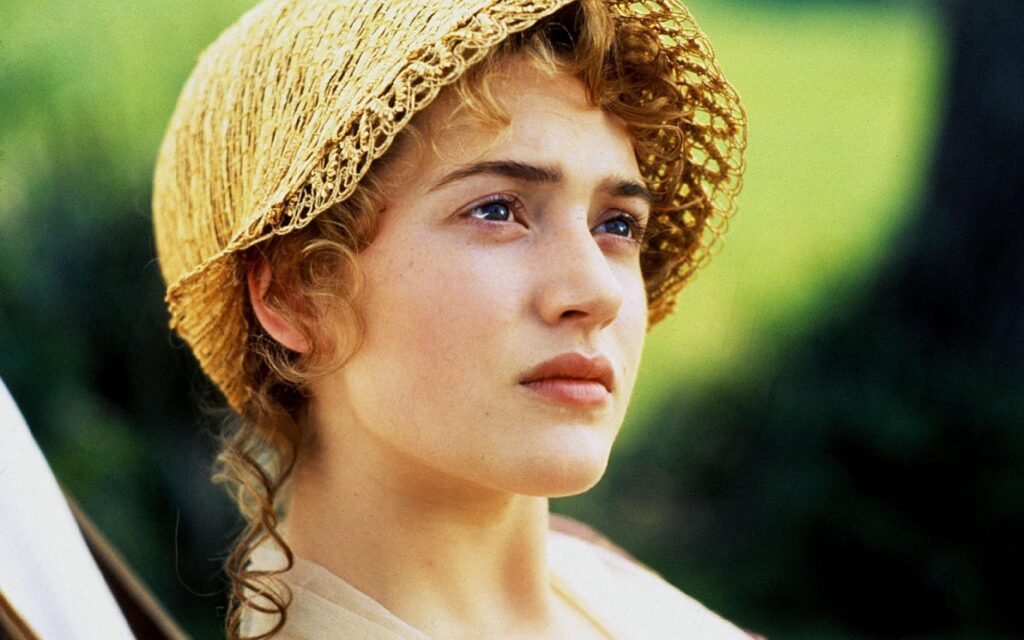
Ang Lee’s 1995 adaptation of Austen’s first novel is popularly held and critically recommended to be THE Sense and Sensibility adaptation to watch. Garnering seven Academy Award nominations, with Emma Thompson eventually winning the Oscar for Best Adapted Screenplay, the film spurred a revival of interest in Austen’s works and paved the way for further adaptations. Aside from meticulous attention to costumes and production design, the film boasts a cast filled with acting legends of the day – from Oscar-winner Kate Winslet to Hugh Grant and the revered thespian Alan Rickman. Screenwriter Emma Thompson also stars in the film as Elinor Dashwood, who, with her sister Marianne (Winslet), must navigate the sudden loss of their family home when their father dies.
The sisters are forced to find wealthy suitors for themselves in hopes that their marriage will help support them financially. The story follows them through numerous intrigues as Elinor and Marianne romance and eventually marry Edward Ferrars (Grant) and Colonel Brandon (Rickman), respectively. The film makes some significant changes to plot details, though never ultimately straying from the novel’s essence. Notably, the male characters are written to be more likable and relatable to contemporary audiences, exhibiting far fewer sexist and patriarchal traits than their early-19th-century counterparts. Remarkably, the film’s production involved two firsts – it was Ang Lee’s first feature outside Asia as well as Emma Thompson’s first screenplay, which she spent five years developing. Nevertheless, the film became an outstanding success when it was released and continues to represent the highest of standards when it comes to adapting period classics.
1. Pride and Prejudice (1995 TV series)
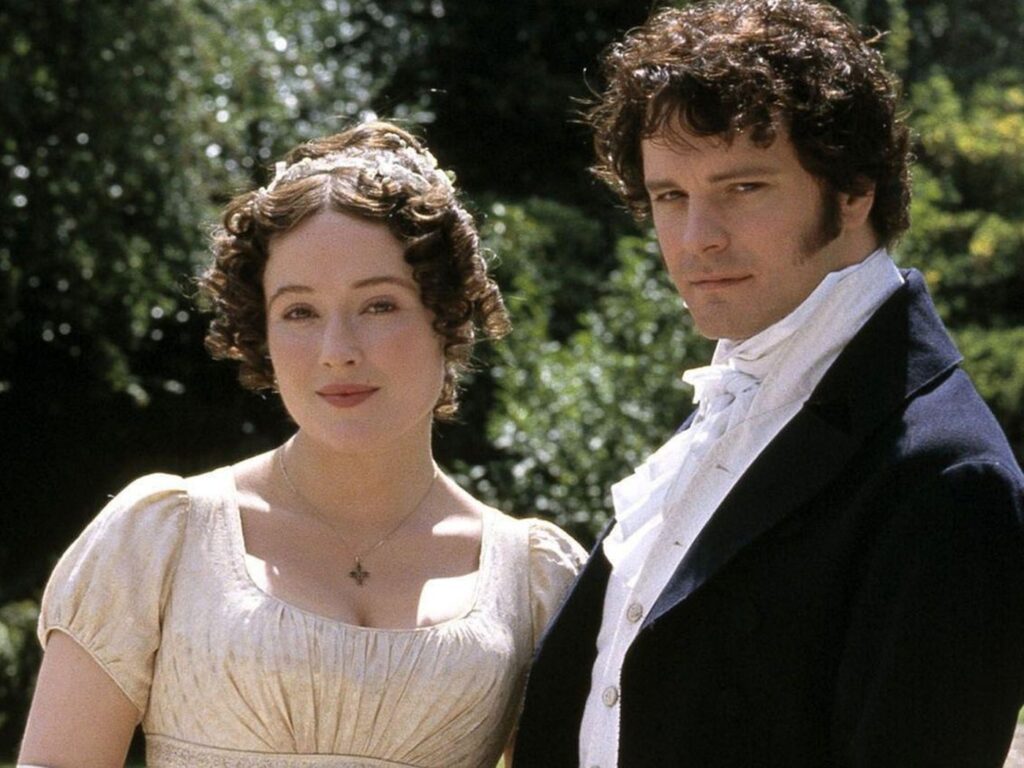
Topping our list of Jane Austen screen adaptations is the much-venerated BBC television series Pride and Prejudice, consisting of six 55-minute episodes, which allow it to represent the novel’s intricacies with greater care than the feature film format. Not only is it the most well-received of all the adaptations in this list, but it’s also the one that stays the most faithful to its source material, presenting a vivid representation of life in early 19th-century England, down to the costumes and precise mannerisms typical of that time. Jennifer Ehle plays Elizabeth Bennet, who, for the sake of saving her family from financial ruin, must secure herself a wealthy match. Through repeated clashes and misunderstandings, she gets closer to Mr. Darcy (Colin Firth) and eventually falls for him.
The screenplay by Andrew Davies, while staying remarkably close to Austen’s book, also departs from it in ways that modernize the depiction. Unlike the Darcy of the novel, whose emotions remain mostly obscure to the readers as well as Elizabeth, Colin Firth’s character is more expressive verbally and often engages in activities (such as billiards and fencing) that portray him as the object of female desire. Some of the characters are comically exaggerated to inject some wit and laughter into the story, as opposed to the more uptight tonality of Austen’s book. Pride and Prejudice won an Emmy for its costume design and secured a BAFTA for Ehle’s committed performance as Elizabeth. It also served as the big break that made famous Colin Firth, who later went on to win an Oscar for his acting. For old fans of Austen and newcomers alike, this TV series remains a must-see adaptation of a timeless tale.

